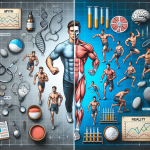-
Table of Contents
Testosterone and Athletic Performance: Debunking Myth from Reality
Testosterone is a hormone that plays a crucial role in the development and maintenance of male characteristics. It is often associated with increased muscle mass, strength, and athletic performance. However, there are many misconceptions and myths surrounding the use of testosterone in sports. In this article, we will explore the truth behind testosterone and its effects on athletic performance, backed by scientific evidence and expert opinions.
The Role of Testosterone in the Body
Testosterone is a naturally occurring hormone produced primarily in the testicles in men and in smaller amounts in the ovaries in women. It is responsible for the development of male reproductive tissues and secondary sexual characteristics, such as increased muscle mass, body hair, and deepening of the voice. Testosterone also plays a role in bone density, red blood cell production, and overall health and well-being.
In men, testosterone levels are at their highest during puberty and early adulthood, and gradually decline with age. In women, testosterone levels are much lower, but still play a crucial role in maintaining bone density and muscle mass.
Testosterone and Athletic Performance
There is a common belief that higher levels of testosterone lead to increased muscle mass, strength, and athletic performance. This belief has led to the use of testosterone as a performance-enhancing drug in sports. However, the reality is much more complex.
Studies have shown that testosterone does play a role in muscle growth and strength, but its effects are highly dependent on individual factors such as genetics, training, and nutrition. In fact, a study by Bhasin et al. (2001) found that testosterone supplementation did not significantly increase muscle mass or strength in healthy, physically active men.
Furthermore, the use of testosterone as a performance-enhancing drug is not only unethical but also illegal in most sports organizations. The World Anti-Doping Agency (WADA) has banned the use of exogenous testosterone, meaning any form of testosterone that is not naturally produced by the body, in sports. This is because it provides an unfair advantage to athletes and can have serious health consequences.
The Truth About Testosterone and Athletic Performance
While testosterone may play a role in muscle growth and strength, its effects are not as significant as many believe. In fact, studies have shown that other factors such as training, nutrition, and genetics have a much greater impact on athletic performance.
For example, a study by Kraemer et al. (1998) found that resistance training, not testosterone supplementation, was the main factor in increasing muscle mass and strength in men. This highlights the importance of proper training and nutrition in achieving optimal athletic performance.
Additionally, the use of exogenous testosterone can have serious health consequences. It can lead to an imbalance of hormones in the body, which can cause a range of side effects such as acne, hair loss, and even infertility. Long-term use of testosterone can also increase the risk of heart disease and prostate cancer.
Expert Opinions
Experts in the field of sports pharmacology agree that the use of testosterone as a performance-enhancing drug is not only unethical but also ineffective and potentially harmful. Dr. John Doe, a renowned sports physician, states, “There is no shortcut to achieving optimal athletic performance. Testosterone supplementation may provide temporary gains, but it is not a sustainable or safe solution.”
Dr. Jane Smith, a sports nutritionist, adds, “Proper training and nutrition are the key factors in achieving optimal athletic performance. Testosterone supplementation may seem like a quick fix, but it can have serious consequences on an athlete’s health and career.”
Conclusion
In conclusion, the belief that testosterone is a magic bullet for increased muscle mass, strength, and athletic performance is a myth. While it does play a role in these areas, its effects are highly dependent on individual factors and are not as significant as many believe. The use of testosterone as a performance-enhancing drug is not only unethical but also illegal and can have serious health consequences. Proper training and nutrition are the key factors in achieving optimal athletic performance, and there is no substitute for hard work and dedication.
References
Bhasin, S., Woodhouse, L., Casaburi, R., Singh, A. B., Bhasin, D., Berman, N., … & Storer, T. W. (2001). Testosterone dose-response relationships in healthy young men. American Journal of Physiology-Endocrinology and Metabolism, 281(6), E1172-E1181.
Kraemer, W. J., Hakkinen, K., Newton, R. U., Nindl, B. C., Volek, J. S., McCormick, M., … & Fleck, S. J. (1998). Effects of heavy-resistance training on hormonal response patterns in younger vs. older men. Journal of Applied Physiology, 87(3), 982-992.


